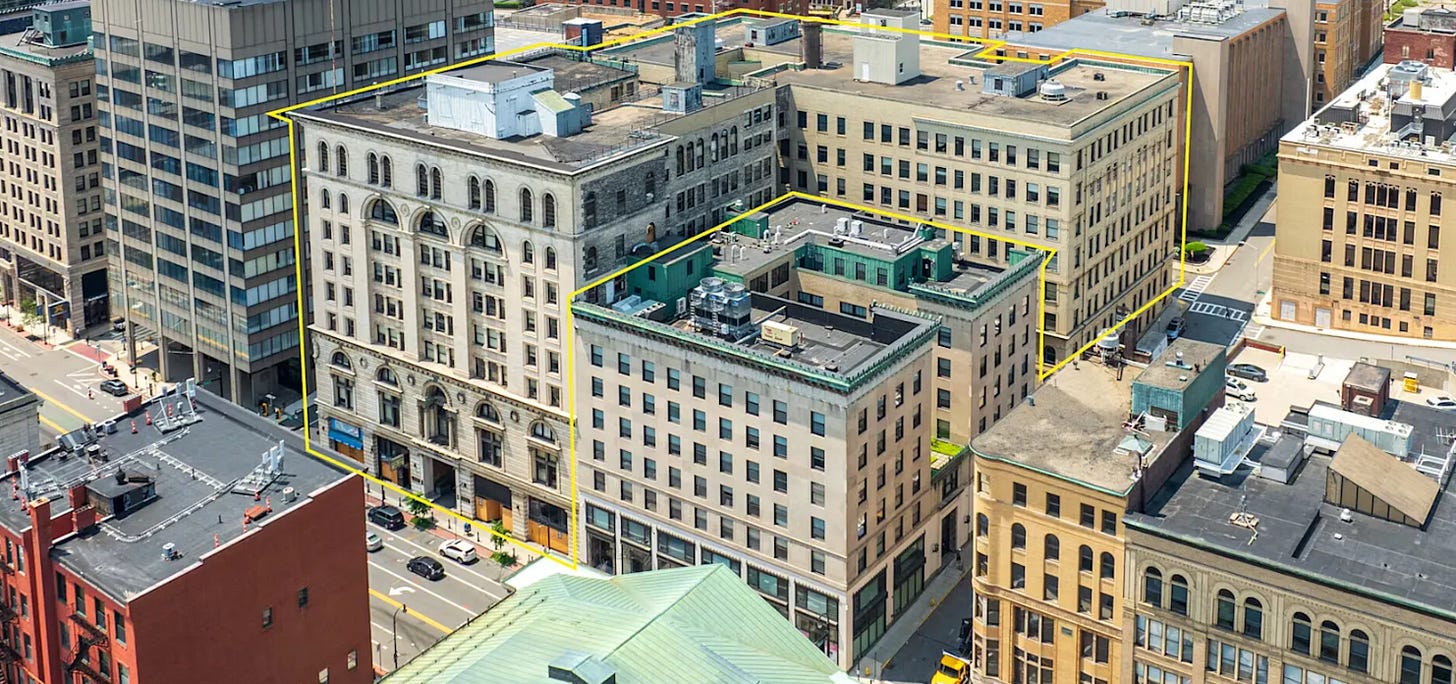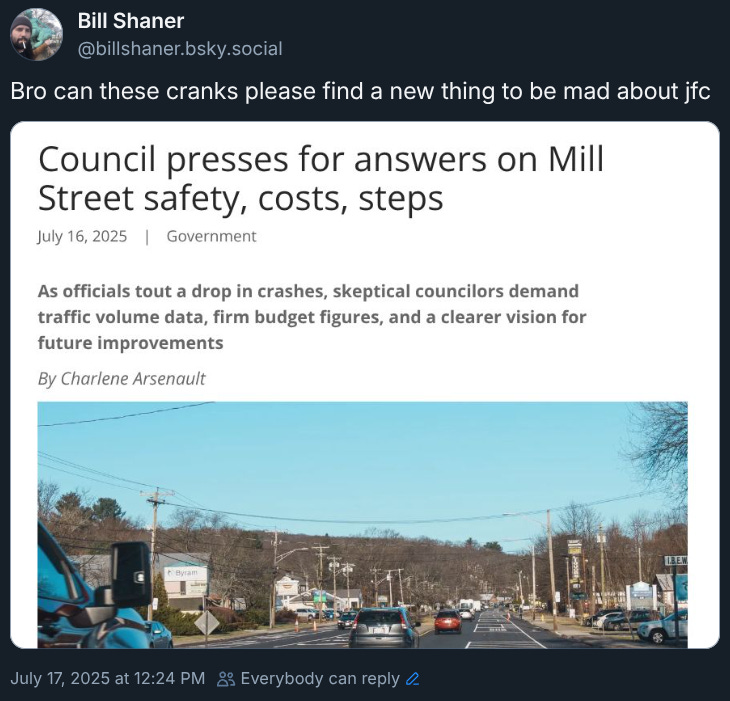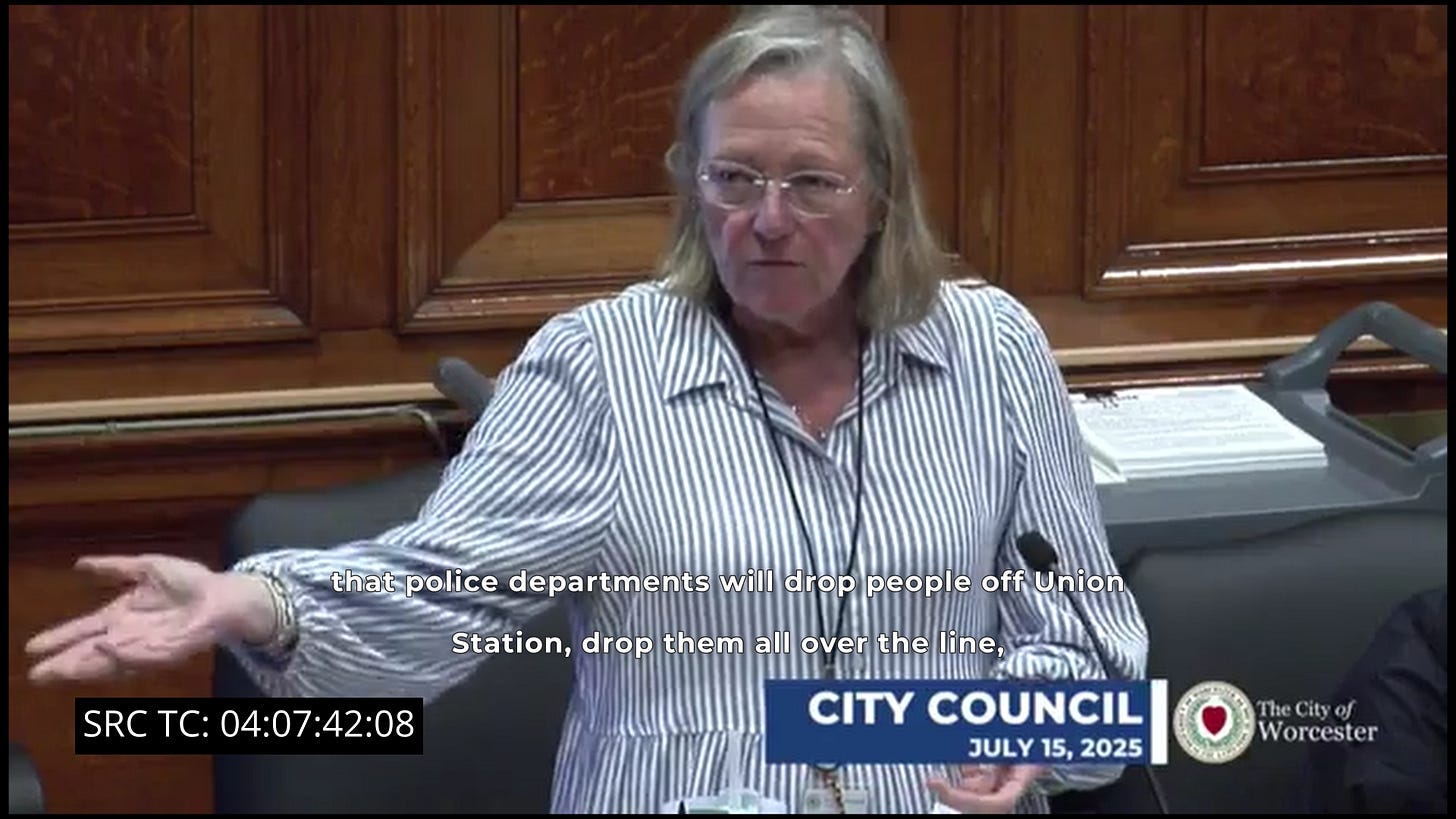Holding the uncomfortable bag
A textbook-ready example of corruption, the death of the Commerce Building, the evil rhetoric of "the towns"
What’s up everyone! As of my writing this sentence specifically I’m sipping the dregs of an affogato, fancy boy that I am, having just returned from a lovely but very hot couple hours on the patio at Ralph’s Rock Diner for the Wootenanny political action comedy show in support of Rob Bilotta. Best part I have to say—sorry Rob!—was Phil Palmieri (if you know you know, if you don’t keep it that way). I observed him from afar as he sat motionless, stonefacing every single comic with his tiny little sunglasses and gravity-defying hair... always somehow lilting in the opposite direction of the breeze.
Every single comic looked a little shook, like something was off. Something over and above having to work a small, mostly non-comedy scene crowd, all baking in late afternoon sun. No doubt in my mind it was the presence of Phil. An unknowable aura. Can you imagine what it was like for these comics? Feeling it but not knowing the source? Like a ghost passing through you. But not from the spirit world. From whatever the opposite of that is. From the sort of terrestrial realm a spirit wouldn’t dare enter. Come to think of it, that’s a decent way to describe lower Shrewsbury Street.
And before you say hey you’re not even from here (looking at you, Steve 101), remember... I am a small businessman in this community. And I got my start on Shrewsbury Street. Just like Anthony Petrone. (Except I actually do something for you guys whereas he just collects and/or evicts and/or arrests. Otherwise he goes about his various schemes, always somehow involving State Sen. Michael Moore.) And while I’m not Italian I am Irish and in Massachusetts those are the same thing functionally. One’s more red in the nose and the other does more sex crimes but otherwise tomato tomato. I don’t like it I’m just calling balls and strikes here. If you don’t know which is which vis-à-vis red nose vs sex crimes: good. Keep it that way. If you do, you know what I say is the truth.
Another thing I’m sorry to report: we must accept as a matter of fact that Phil Palmieri is The Most Worcester Guy. No one has ever been Worcester like that. No one ever will be. He wears the crown... and it is obviously heavy. So so so so heavy.
What a start, what a start... can you tell I’m grasping to write about anything other than the city council meeting this week? I will be spending some time on it. Because I must. Because I want this board to change for the better so badly I’m duty bound to document why it’s so goddamn awful. And we have a special guest column from Johanna Mulhane! On the ongoing drama over a proposed sprinkler ordinance, a story which lays bare some of the most obvious corruption in the city. It’s really good! We’ll lead with it.
First, let me humbly ask that you consider supporting this outlet. I’m down about a dozen—not unusual this time of year but nonetheless psychically damaging to see every time I open the dashboard.
Subscribers get a discount on merch and this week I’m trying out another paid subscriber perk: full transcripts of the city council meeting with speaker names and timestamps. Here’s the one for Tuesday’s meeting. Certainly some of you will find it as useful as I have.
Venmo a tip / Paypal a Tip / Merch Store / Bandcamp
Let’s quickly catch up on the week!
Weekly Index
A must-read Tom Marino story in This Week In Worcester ran Monday: “Refusing to Believe Lies is Anti-Police Sentiment in Worcester.” ⩫ The city council met for five and a half hours Tuesday. One of those hours was spent relitigating Mill Street. A desperate Moe Bergman grasped for conspiracy theories to explain empirical evidence of safety improvements. Another hour was spent on the question of whether the public has a right to file petitions. Time spent on housing affordability: 36 minutes. ⩫ The city-owned grocery store pitch from Jenny Pacillo proved cause for grave concern. Pacillo amended it to make clear the city wouldn’t actually run the store. Wings clipped off a good idea before it can take flight. ⩫ City Manager Eric Batista said there’s a contraption akin to a “water lawnmower” doing weed control in Indian Lake. On Thursday, Shaun Connolly got visual confirmation of the water lawnmower. ⩫ Punk In The Park, a touring festival set to come to the Palladium in September, is embroiled in controversy over the organizer’s donations to and love of Donald Trump. Bands are already dropping the upcoming Denver show. ⩫ Longtime Telegram photographer Steve Lanava died. He was 73. ⩫ An oyster bar run by Niche Hospitality opened in the Canal District. ⩫ A new spray park at Crystal Park will open this weekend after mounting resident complaints of it just sitting there, not sprinkling. ⩫ A five-foot-long lizard is on the loose in Webster.
Upcoming stuff
On Tuesday I’m giving a little talk on local journalism at the Framingham Public Library.
On Friday at-large council candidate Cayden Davis is having a bingo fundraiser at the Kenmore Diner.
And Thursday the 31st: Worcester Sucks Election Squad at Steel and Wire!! Don’t miss out it’s going to be a barn burner.
Next month, August 31, there’s a whole ass drag festival, freshly announced.
Ok mark those calendars folks. Now to Johanna!
Why hasn’t Worcester opted in to the Fire Sprinkler Ordinance?
By Johanna Mulhane
The first time I saw my dad cry was in the days following the Cold Storage Warehouse fire. He was a WFD captain at the time, and finally came home for a bit from the scene. Six firefighters were killed. Two by two they went in, first looking for victims, then trying to recuse their lost brothers. It took eight days to find all their remains in the rubble. There he was, on the edge of the couch, my mother’s hand on his back, sobbing, head in hands, asking repeatedly “Why?” Since then three1 more Worcester Firefighters and at least nine residents, just since 2021, have died in house fires, each one of them a universe.
MGL Chapter 148, Section 26 I (I’ll refer to it as the Fire Sprinkler Ordinance) is an opt-in state law that in layman’s terms says: if you own an old 4+ unit building and are gutting it, you gotta put sprinklers in.
According to the City Manager, in Worcester, “it would require automatic fire sprinklers in residential buildings with four or more units that undergo "substantial rehabilitation,"... substantial rehabilitation [is defined as] work that makes the structure "as good as new."
193 other cities in towns in Massachusetts have already opted in. The Fire Chief and City Manager have gone on record urging the council to opt in. So have neighborhood association leaders, the State Fire Marshal, the president of the National Sprinkler Association, rank and file firefighters and other experts. But it has not come to the floor for a vote. Why?
Councilor Haxhiaj learned of this state ordinance from WFD Captain Bull, after the Washington Heights fires in January, which displaced over 60 people and destroyed 60 apartments. She brought this before the city council shortly after. It was immediately held by Councilor Mero-Carlson, without explanation. In February, the City Manager and Fire Chief officially asked the council to vote to opt into the ordinance. It was held again by Candy Mero-Carlson and again without explanation. George Russell threw in a couple orders, including one requesting a report about the cost to multi-unit property owners. The report came back: Costs would be negligible.
In April, it was sent to the Public Safety Committee for consideration, where Councilor Toomey is the chair.
In June, I reached out to Councilors Toomey and Mero-Carlson. I asked Mero-Carlson why she held the item so many times—I never received a reply.
I then asked Councilor Toomey why she hasn't put the item on her Public Safely Committee agenda yet, despite assures she would back in April. She told me she was waiting to hear back on an order about costs to property owners. My pointing out that this already happened was ignored.
This past Tuesday Kate spoke on an order she filed, requesting:
a report concerning the economic impact property owners may feel should the city adopt Mass. General Law Ch. 148, Section 26I, which mandates the installation of automatic fire sprinkler systems in residential buildings with four or more dwelling units. Said report should include any residual effect said adoption may have on renters.
Kate Toomey, chairwoman of the Public Safety Committee for going on a decade (reappointed again and again by Mayor Petty) is concerned about the hypothetical economic impact multi-unit property owners may feel. The hypothetical economic impact that has already been addressed on the council floor by the city manager and fire chief after Councilor Russell’s order in February.
We’re not talking about mom and pop landlords here—an in-law apartment or even a three decker. Also if you’re the owner of an old 4+ unit building and you’re gutting it, and you are trying to weasel out of fire sprinklers—you’re a scumbag and people looking out for those people are either scumbags as well or something else that’s also not a great look.
This is a common sense, life saving choice for the city council to make. The potential properties affected according to the fire chief would be “a small segment of older buildings where current codes may leave room for interpretation” he continued that “By adopting Section 26I locally, we ensure that no gaps in fire safety remain, particularly in these vulnerable structures.”
So… what gives? Just. Opt. In. Our firefighters are asking you to, our city manager is asking you to, your constituents are asking you to.
Why are they doing this? Candy, Toomey and George have been on record pushing back on it. Who else is? Could it be because a majority of the conservative councilors are landlords? Could it be because Councilor Haxhiaj is the person bringing it forward? I don't know if we’re dealing with apathy, ignorance, greedy property owners, parasitic developer donors, or just petty interpersonal drama.
Thankfully we have Etel, who responded to Toomey’s order Tuesday with this-
“If Councilor Toomey would be amenable to this… I would like to add to the report that the City Manager and the Fire Chief also breakdown the human cost of losing lives should chapter 148 section 26 I not be adopted.”
Spoiler alert: She wasn’t amenable. She motioned for the mayor to not accept Etel’s amendment about the cost of human life. She motioned for the mayor to file Etel’s separately.
It’s been: eight months since Councilor Haxhiaj first brought the order to the council; six months since the fire chief and city manager urged the council to opt into this ordinance; four months since it was referred to Councilor Toomey’s Public Safety Committee.
Sunday night, 10 senior citizens died in a fire in Fall River, the chief told reporters firefighters saw faces in windows and had to decide who they could rescue. Then he broke down. Firefighters had to pull charred corpses out of the wreckage. Kate Toomey stood up days later, on Tuesday night, and asked not about fire safety but about multi-unit property owners’ wallets, kicking any chance of passing this ordinance further down the line.
Please reach out to Councilor Toomey to let her know we want her to treat this with the respect and urgency it deserves, for our residents, our first responders and our dwindling affordable housing stock, demand she rescind her redundant order—remember there was already a report answering this question in February—and put the item on her next committee agenda then recommend it go to council for a final affirmative vote ASAP.
Chair Toomey: ToomeyK@worcesterma.gov, Vice-Chair Bergman BergmanM@worcesterma.gov, Member Ojeda OjedaL@worcesterma.gov
Etel’s OpEd: Opting in to sprinkler law will save more lives in Worcester
Spectrum News: Worcester Leaders Looking to Implement Sprinkler Law in the City
Mass Live: Worcester City Manager Pushes Sprinkler Law After Major Residential Fires
Petrone’s Properties
Back to me (Bill) now! This morning, reading Johanna’s submission (great work!) I thought to myself hmmm what do Candy Mero-Carlson and Kate Toomey have most in common as it relates to sprinklers in rental properties—ah, obviously: police union president and landlord Anthony Petrone.
Petrone, it just so happens, is a landlord in possession of at least two properties that would be affected by the new sprinkler ordinance. Via his real estate company, I A R LLC, he owns 63 East Central Street and 242 Shrewsbury Street. Both have four units and almost certainly do not have sprinkler systems, though I couldn't find a way to fully verify that bit as of press time. No building permits from 2015 to present is closest I can get right now. But like... just look at this one...
The betting odds are pretty obviously on “no sprinkler system.”
Toomey and Mero-Carlson both pretty much work for Petrone, albeit in slightly different capacities. Petrone, being who he is, can generally expect the city councilors under his control to do what he wants. He has six of them, though Toomey and Mero-Carlson are let’s just say direct reports in a way the other four aren’t. So it would make sense they’d be holding the uncomfortable bag here.
Uncomfortable for Toomey, because she’s chair of public safety and sprinklers are obviously a public safety concern. As Johanna reported, the fire department, the city manager, everyone wants this. Except some choice landlords, propertied in the “4-8 unit” category, one of them happening to have Toomey’s unwavering fealty. Like I said last post, Toomey’s definition of public safety and ours are a bit different.
Even more uncomfortable for Mero-Carlson, because the deadly Gage Street fire in her district is among the city’s worst tragedies in recent memory, and a lack of sprinklers played a key role. Already down the rabbit hole this morning, I went back and pulled the tape from an August 22, 2023 council meeting. Candy spoke at length about a report on inspections of the building. A report she asked for. She said (~3:20:00 in):
“I really think it's important for us as a city to get a handle on, as we talk about problem properties… and this council has spent a lot of time talking about making sure that we staff Inspectional Services and as well as a lot of our other departments because we need to know what is happening and more importantly, I think it's critical that we make sure that we take care of our residents.”
Tough to be on record saying “we need to make sure that we take care of our residents” after a deadly fire, then suddenly reverse course on the issue of sprinklers to say hey what about the landlord(s)?
Probably why she’s mostly let Toomey do the talking over this months-long drama.
At the meeting Tuesday, Toomey said “I've received a number of phone calls, people querying about issues and concerns.”
Perhaps it would have been more accurate for Kate to say she received precisely one call, and that’s all she needed. When Toomey said the following on the city council floor....
The current building codes have changed dramatically over the past twenty years, so there are very few buildings that this would impact.
...was she simply repeating exactly what Petrone told her? She read from a printed out piece of paper as she spoke. And at the last public safety committee meeting she read directly from an email Richard Cipro sent to her. Then did what the email requested. The betting odds here are she was reading a printed out email from Petrone. But it doesn’t matter.
What does: This is far far far from the first time Toomey has been caught doing stuff like this. Through her, it is quite obvious, Petrone and Cipro have a seat on the city council. And she is the most electorally safe councilor by a mile. A sad reality we must accept. Also, by the way, a textbook-ready example of corruption in local politics. Just in case you were wondering. It’s the sort of example that would be summarily rejected if it were fiction. Too obvious, too on the nose.
Because of our paid subscribers the work we do here is free of constraints that keep other outlets from telling certain truths. We can say the part that really needs to be said and without us wouldn’t. Today’s post is a good example I think.
It is entirely unlike the coverage of the council you may have read in the Telegram, Masslive or the Guardian. Especially that last one. My god.
There are other good ways to support this outlet as well.
Venmo a tip / Paypal a Tip / Merch Store / Bandcamp
Now onto even more fun stuff.
The Commerce Building marks the end of the Renaissance

You can chart an accurate and frankly brutal economic history of the last century of this city through the Commerce Building alone. The building, now boarded up and back on the market for a fifth the price it last sold for, in 2020, was Worcester’s first skyscraper, built in 1897. A grand project of State Mutual, the life insurance company which came to all but controlled city hall as the post-war period boomed for insurers and busted for factories. A company town in all but name. So, in the mid 1950s, it was a massive deal when the company, which would go on to be renamed Hanover, announced plans for an even grander headquarters outside the urban core. Up on Lincoln Street, by Green Hill Park, where it remains today. And where, conveniently, a highway would soon be built with an exit all but dedicated to Mr. Plumley and his new, modern digs. But that’s a story for a different time.
Left in the wake was the Commerce Building. Like the rest of the downtown, it would dive headlong into decades of decline, at the mercy of slumlords and grifters, in the shadow of despair caused by over policing and the hollowing out of urban density caused by the highway. The building watched as successive “One Weird Trick” mega-projects went in around it, all repeating a familiar cycle of promise and disappointment. Salvation has arrived for downtown! Ahhh well maybe not. Next time. Political careers were made on the promise and solidified by the time the let down set in. The Galleria, St. Vincent, The DCU Center, Polar Park. Boom, bust, repeat. Renaissance, hard times, renaissance, hard times. All the while the downtown became less and less hospitable to human life, to the point now that it cannot sustain a single grocery store or pharmacy. The new denizens of downtown Worcester drive straight into their parking garages and straight out of them. The suburban boomeranging back to the urban core. No one’s walking around and so no one walks around. Besides, that’s how people die in this city, famously.
It was during the latest “promise” stage of the latest salvation cycle that The SilverBrick Group bought the building for about $14.5 million. The New York/Miami(?)-based company planned for 312 apartments—a total revitalization of a mostly empty building, a piece of noted sketchy real estate dynasty the Krocks’ hollow, provincial real estate empire. Then the market changed. Borrowing money wasn’t so easy. By 2022 they’d scrapped any plans they had. Now, in 2025, they’ve listed the building, per the Telegram, for an insane $3.7 million. More than five times less than they spent for it. For perspective, State Mutual sold the building for $4.4 million in the 1950s. Adjusting for inflation adds insult to injury: $52 million in 1956 to $30 million in 2020 to $4 million in 2025. Gradual decline, then freefall.
The freefall can be explained, in part, by several recent calamities: burst pipes and electrical failures. The sort of things that a “bad homeowner” would allow to happen to their home. The sort of death knells for the long-term health of a building that are avoidable with some light preventative maintenance. SilverBrick apparently didn’t do any of that. They let the building rot after their plans for short term windfall profits were killed by the Federal Reserve. House of cards meets breeze. Say what you will about Barry Krock or any of the other downtown slumlords to preside over these empty husks downtown, they didn’t let buildings physically fall apart like that. In the process, we lost Spoodles Deli, one of the rare holdouts of an earlier time when the downtown could support a small business. In the place of that anchor for at least some midday foot traffic, we have boarded windows making strikingly plain the urban wasteland that is and has been that stretch of Main Street.
What is SilverBrick anyway? The Telegram describes it as a Watertown-based developer but that’s not accurate. Their headquarters is in New York, according to its website. Its listed address is in Miami. Under a rotating series of images on the website, from upshots of skyscrapers to a Business Deal style handshake and back, their tagline opens:
SilverBrick targets mismanaged properties where repositioning can unlock hidden value. Our experience, access to deal flow, industry relationships and focus on our niche market gives us a competitive advantage. We specifically target non-institutionally owned properties that are primarily residential. By singularly investing in niche properties, our expertise in this space is exceptional. Further, non-institutionally owned properties often present better value-add opportunities where cost-effective capital improvements and proactive management can dramatically improve occupancy rates and net operating income. We believe the current market provides a rare opportunity for premium returns because mismanaged properties are trading at discounted prices and financing rates are near historic lows.
Seems that the last part is in need of updating! More importantly: Notice, overall, the concentrated focus on returns, the “value-add” and “deal flow.” Little about management of residential property, outside of the fact they target properties they deem mismanaged.
Under the “opportunity” subpage, they talk about “emerging markets,” aka cities freshly “on the map” like Worcester, where “assets” are “trading below replacement costs” and “tax credits are prevalent” and, most importantly, “value-add income producing real estate is largely tax sheltered.”
This is all code for the property is cheap, on the dip of the uneven development rollercoaster, and the local government in the given “emerging market” is desperate. They will—forgive me for this—show hole. They’ll give you whatever they can if they see you’re ready to hit the ATM. That political and economic reality in a given locality, combined with access to borrowing at “near historic lows,” comprises the whole of their business model. Hard to see it as anything but predatory. What happened in the case of the Commerce Building is the “near historic lows” piece of the puzzle suddenly went missing. So they just poof. Dropped the property. And allowed it to fall into disrepair while they camped on the equity. The business that trades in “mismanaged properties” mismanages the property the second it does not present “opportunity.” For that, they faced no recourse from the municipality, and shouldn’t expect to.
The company also, for what it’s worth, loudly advertises to investors that the returns it provides are “largely tax-sheltered.”
SilverBrick provides its investors with quarterly distributions in perpetuity or lump sum distributions from liquidity events. Distributions are largely tax-sheltered, creating an effective return that can be much higher than alternative instruments, such as stock market dividends, treasuries, CDs or gold.
Lol. Evil.
A New York-based financial firm overseeing the collapse of a building, demonstrating reckless disregard for the city in which it’s doing business. I suppose we should have seen it coming when, back in 2020, they bought the property via an LLC registered in Delaware, the tax evasion capital of the world. Just a fun fact I noticed in the deed.
This company from NYC/Miami/Delaware parachuted in here to cash in on the manufactured hype emanating from the latest of our silver bullet schemes, and carelessly mismanaged a property into a state of disrepair. So much so Peter Dunn is quoted in the Telegram saying the city is anxious to find a buyer because of the fire hazard posed by the building in its current state. This mismanagement resulted in the loss of a small and well-loved Worcester business in the part of the city that’s supposedly experiencing a renaissance.
All’s to say: where is the outrage? You’d think a reactionary, nativist city council like Worcester’s would be all over that one. These out-of-townizs comin’ in heáh... But, no, that would interfere with the going praxis of coddling and debasing ourselves for “the developers.” Begging them for scraps while we fail to take any ownership of our financial future. Just hoping and praying on the next silver bullet prayer. And we see in the company’s marketing material this attitude is baked into their predatory, speculative and “tax sheltered” business model.
I mean for the love of god look at the line I highlighted below in the biography of the company’s head of facilities. Made me laugh out loud.
Energy savings liiiiiike not paying for heat in the winter so the pipes burst? Wasteful spending in the speculation business. Where the building and the city it sits in are at best secondary concerns to the asset—one they are telling prospective investors out loud is more “tax sheltered” than the stock market.
And because of this investment firm’s reckless disregard for the physical plane of Worcester MA we’re stuck with a building that is almost sure to be condemned, on its way to vacant lot status via eminent domain or otherwise. Another hole in the city’s heart we failed to see coming because we didn’t want to look. Didn’t want to believe it. When State Mutual’s relocation plans were news back in 1956 CEO H Ladd Plumley told the newspapers “the company realizes its civic responsibility.” Posturing benevolence, as it seems he was quick to do and reporters were quick to swallow it, he continued: a condition of any sale would be that it is kept as “a first class business property.”
The City Can’t Actually Do Something
In the light of that not wanting to look, the conversation at council Tuesday around Jenny Pacillo’s suggestion the city run a grocery store proves very interesting.
Our crank contingent, joined by the Chamber of Commerce, was reflexively hostile to the idea, to the point Pacillo had to water down this proposal for a project that was never going to happen anyway to make it clear the city wouldn’t run the supermarket, it would just be the landlord.
Chamber representative Mike Kane spoke at public comment, weepily intoning that “while it is a well intentioned idea, it could unintentionally compete with private businesses, and we're cutting local entrepreneurs who are already serving our neighborhoods.”
George Russell of course followed suit: “I think that our city manager has enough other things on his plate now and we don't need to get him a butcher's apron and put him to work in the supermarket.”
Bergman said what about the liability risk, something he’d never say about our biggest liability, the police department.
Colorio, on the fly, talking about “any government-run grocery store” as if she’s ever once in her life been to one or seen one: “The way that it was originally written, I could not support that because in any government-run grocery store, you've got less choices, not more, less availability, not more, and higher prices.” A Facebook meme read into the record.
None of them talked about the need, let alone what it could do for “vibrancy.” It became a culture war thing. A venue to redress grievances. To reaffirm the dimness of their imagination. Talk about what the government certainly cannot do. They didn’t want to look at what the government could.
A neat example of the insane political reality that gives us a know-nothing conservative councilor like Bergman in the anchor city of a district that elects a progressive U.S. congressman like McGovern: on Talk of the Commonwealth Thursday McGovern said he supports the idea, and did so without any hemming and hawing. He led with the good it would do. Not with the problems it would present.
“I think that's a good idea, specifically because we're having trouble getting a supermarket operating downtown and I think it's an idea worth pursuing and looking at to see whether it's feasible,” he said.
Meanwhile—back to Toomey!—another of our crank city councilors indulged the well-worn conspiracy theory that police departments in “the towns” are driving unhoused people over the line into Worcester and dropping them off. Something which every self respecting crank takes as a matter of fact but has never been seen let alone proven—a crime with no motive whatsoever.
Worcester has a lot of programs and facilities and services that assist people who are in the throes of addiction and so what happens is that cities and towns say ‘go to Worcester.’ As a matter of fact we all know that police departments will drop people off Union Station, drop them all over the line, you know and say hey you know go to Worcester they'll take care of you.
We all know. The context in which she said this—requesting a regional approach to addiction services in which all communities in a given metro area pool resources—is not a terrible idea on the face of it. But the “they’re dropping ‘em off” line, used as justification the way she does, betrays a fundamental cruelty in Toomey’s thinking that makes her proposal deeply unserious. It is a rhetoric of self-victimization. It takes for granted the source of the problem is not addiction—what this society does to addicted people, what the drug war and how police departments prosecute it do to communities—but that addicted people are in the immediate vicinity of where she happens to be. That she has to see them in her city and not “in the towns.” If they happened to be elsewhere, the “problem” in Toomey’s imagination would also be elsewhere. It is a logic of removal. It reduces human beings to blight. It is one of the many deeply inhumane and immoral orienting principles that simple people in this simple city have swallowed hook line and sinker.
Toomey will never not once in her life understand that “economic development” and policing work in tandem to manufacture homelessness—here and everywhere else in America. She will never understand that property law is class warfare with the express objective of driving hardship to the density of a metro area’s urban core, away from the necessarily manufactured pleasantries of the suburban periphery, and then from there to the largest prison population in world history—an automated apartheid of world historic proportions. One that denizens of the suburban periphery only see through the funhouse mirror of cop shows on the TV and the news programs that mirror them. The fear of ending up that way keeps them compliant as their quality of life too diminishes and they too become addicted to laundered and medically sanitized versions of the same drugs, prescribed by doctors to dull the same spiritual malaise that leads the less fortunate invariably toward the needle.
Toomey and everyone else like her can’t see that she lives in the core, not the periphery. She becomes indignant when that reality is made obvious by the “blight” of desperate people idling in a public place nearer than she’d like to her nice neighborhood.
She will support both the police and the prevailing economic development edict wholeheartedly as long as she lives. She is far from alone. It is a rationally irreconcilable position, one that falls apart under the magnifying glass of even light critical thinking. And so the myth of “dropping them off” swoops in, offering the easy answer to an otherwise difficult equation. If only “the towns” were doing more, they say, absolving themselves of the integral role they play in the immiseration machine.
Toomey, especially, who says “We” when she speaks about the police, who takes her marching orders straight from the police unions, who works for the sheriff, will never ever ever understand what you’re currently reading. Perhaps you don’t either. If so, it’s not your fault. It only becomes your fault when you dig in, when you take what I’m saying as a personal attack and not a hand outstretched, begging you to begin a process of unlearning I’m a decade into at this point. To understand what it is we’re really up against here. In case you haven’t noticed the man behind the curtain is getting antsy of late. If your net worth is closer to zero than a billion this is not an academic concern for you.
Places like Holden and Boylston become the scapegoat for the existence of the wider scapegoat, the one on the street corner, in the tent, shaking a cup of change, holding a cardboard sign at the intersection. Who you feel you have a right to call the police on for the crime of existing, an entitlement happily affirmed by bloated police departments’ dutiful responses. They need people to run through the system to justify the weight of their bureaucracy, during the least violent time in human history, when even they agree social workers would do much of their job better. It’s all mission creep to keep the mission going.
The thought I’ll leave you with: what self respecting police officer would transport an unhoused person to another jurisdiction, thanklessly and secretly, risking their careers, when they can publicly transport them to jail whenever they want for any number of legally enshrined reasons and be rewarded for doing so? What self respecting police department would fork over that kind of perpetual cash cow to another town?
If unhoused people are coming here from “the towns” for any reason and in any real numbers—for which there is no evidence, nor would it matter—it is to escape the police of those other towns. To think that the cops anywhere are invested in anything other than trapping these people in cyclical patterns of police contact in perpetuity is to grossly misunderstand the cops. Would a chef walk to another restaurant with a perfectly good fillet and throw it through the window? No. That’s his steak to cook. His boss paid for it and he knows how his boss likes it.
The fantasy of “the towns” doesn’t even make sense. It is pure, uncut cope. Real estate speculators like the one I opened with find that willful ignorance especially useful. It’s built into their analysis, the source of the tax breaks they can expect to come in on a flashy promise of salvation.
Just had to get all that off my chest I guess.
There was plenty of other stuff in this meeting. They really cram it in during this insane one-meeting-a-month summer schedule. But I’m at my self-imposed word limit here. Make sure you check out the new transcript feature and let me know if you like it. Not too hard to put together and I think it’s useful.
Odds and ends
A longer than usual post so thanks for sticking with me! Please let me know what your favorite part was...
...and help the cause if you can!
Venmo a tip / Paypal a Tip / Merch Store / Bandcamp
The Internet Archive got a bunch of money from Press Forward to expand local journalism and related community preservation projects. Something to watch with interest.
The new Liz Franczak essay in TrueAnon’s Crackpots newsletter blew my brain wide open.
States are moving fast because movement itself is the strategy. There is no coherent endpoint. The future is not being negotiated, or even forecasted. It's being brute-forced, with money and panic and industrial contracts no one will ever read. We are not preparing for AI, we are enacting it. Not the thing itself, but the political conditions that justify it, a continuous state of exception draped in code.
And zooming back down to Worcester, this is the absolute worst garbage I have ever seen.
Who are these people? Why do they do this?
Ok I gotta run! Have a good weekend everyone. Couldn’t arrange a copy edit for this one so you know the drill: all typos in this email were in fact on purpose.
The first edition of this post lists two firefighters, not three. We regret the error.










This was an extremely strong demonstration of insight, analysis, clarity of purpose, and expression that spans Worcester's history while making powerful observations that help explain its recent past, current problems, and, for the moment, at least irretrievable future. Nice work. The Mulhane piece is stellar, too!
Three Worcester Firefighters have died in fires since 1999- ashamed of my oversight on that. Should have let my dad read the article BEFORE we published it.